Keeping Farming & Ranching Dreams Alive
In Colorado, the AgrAbility Project, a collaboration between CSU Extension and Goodwill Industries, is changing lives.
Vijay Viswanathan, paralyzed from the waist down, and Lexi Bingham, living with muscular dystrophy, have both found renewed hope and independence in farming through AgrAbility’s support.
The project provides customized assistance that enables individuals with disabilities to thrive in their agricultural pursuits. This initiative highlights the power of tailored support in overcoming physical challenges, keeping the spirit of farming alive for everyone.
Supporting Agricultural Families with Disabilities
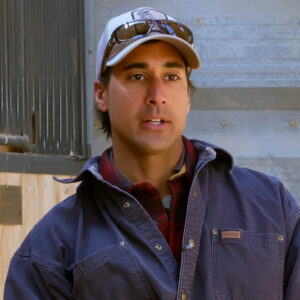
Vijay Viswanathan
For Vijay Viswanathan and his wife, the ideal life is outdoors, working under the Colorado sky, pursuing their dream of managing a small-scall farming operation in Longmont.
“I love it. I love working outside,” Viswanathan said. “That’s probably the main draw for me, is just being out with the animals, being out in nature, in the sunshine.”
But Viswanathan faced a unique challenge as a new farmer: As an 18-year-old, he suffered a debilitating spinal cord injury that left him paralyzed from the waist down. Despite having some specialized equipment and modifications to his property, he was struggling.
During a routine doctor visit, Viswanathan learned about Colorado AgrAbility Project, a partnership between Colorado State University and Goodwill Industries that provides information, education, and services to farmers, ranchers, agricultural workers and their families facing disabilities or other limitations.
“By its very nature, the agricultural industry is challenging both physically and economically,” said Rebecca Hill PhD, co-director of Colorado AgrAbility. “When an individual has a physical limitation, it can be a barrier to success. The Colorado AgrAbility Project was created to help overcome some of these barriers and allow individuals to begin, remain or regain employment in agriculture.”
For Viswanathan, contacting AgrAbility opened a door to a wide range of support options, starting with a site visit to his farm by Candy Leathers, a rural rehabilitation specialist and AgrAbilty project manager.
“Vijay was struggling with a lot of things,’” Leathers said. “Although he had some mobility tools, he needed improved access to a chicken coop he was hoping to make into a production egg business, and he was having trouble with all the physical challenges of purchasing a property that was in somewhat disrepair and needed fences built and materials cleaned up.”
“It was just a breath of fresh air to have somebody here that I really felt like was on my side and wanted me to succeed in my endeavors with turning this place into a productive farm that we could actually generate a little bit of income from, but also has helped sustain our family,” Viswanathan said.
Part of the support AgrAbility provided included arranging for members of Alpha Gamma Rho, CSU’s professional agriculture fraternity, to help perform cleanup and maintenance work at Viswanathan’s farm.
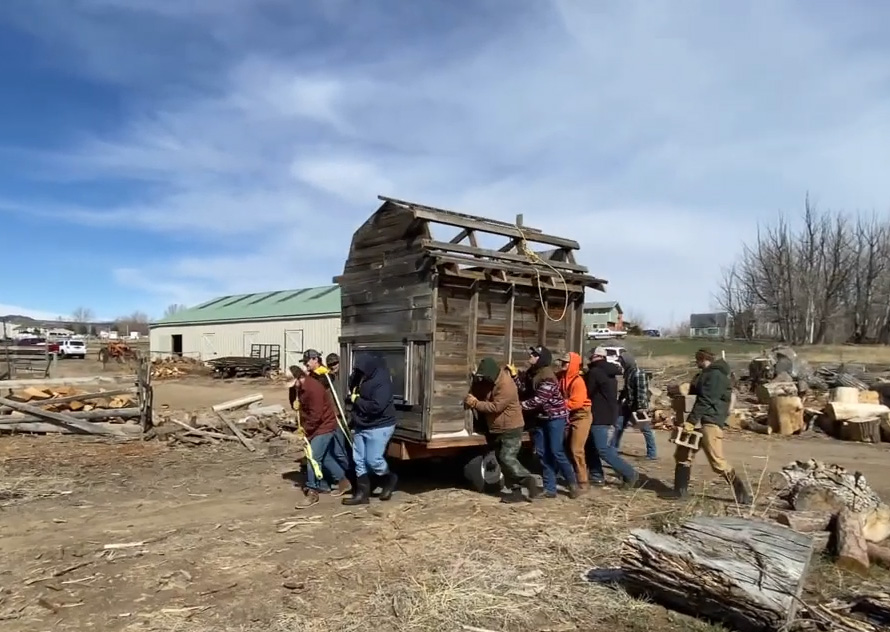
Alpha Gamma Rho members helping relocate and repair chicken coop
“It means the world to us to have these guys here,” Viswanathan said. “There’s only so much you can do with two people, especially when one of those people is wheelchair bound.
“Farming is a full body activity for most folks. And being able to have 20 guys that are out there that have experience in construction, that have experience repairing fence lines, building, they’re probably getting as much work done today as we would get done in a whole year with just the two of us,” said Viswanathan.
“So this really gives us a leg up on the season. It’s going to enable us to have more space for our cows to pasture,” continued Viswanathan. “It’s going to enable us to have more space for our chickens and our egg production. We honestly would not be able to do it without their help.”
“We want to be there. We want to help,” said fraternity member Jacob Cook. “I just hope that it means to them what it does mean to us, really, that we can rely on each other. When they really need us, we want to be able to be there and help.”
‘A blessing to our family’
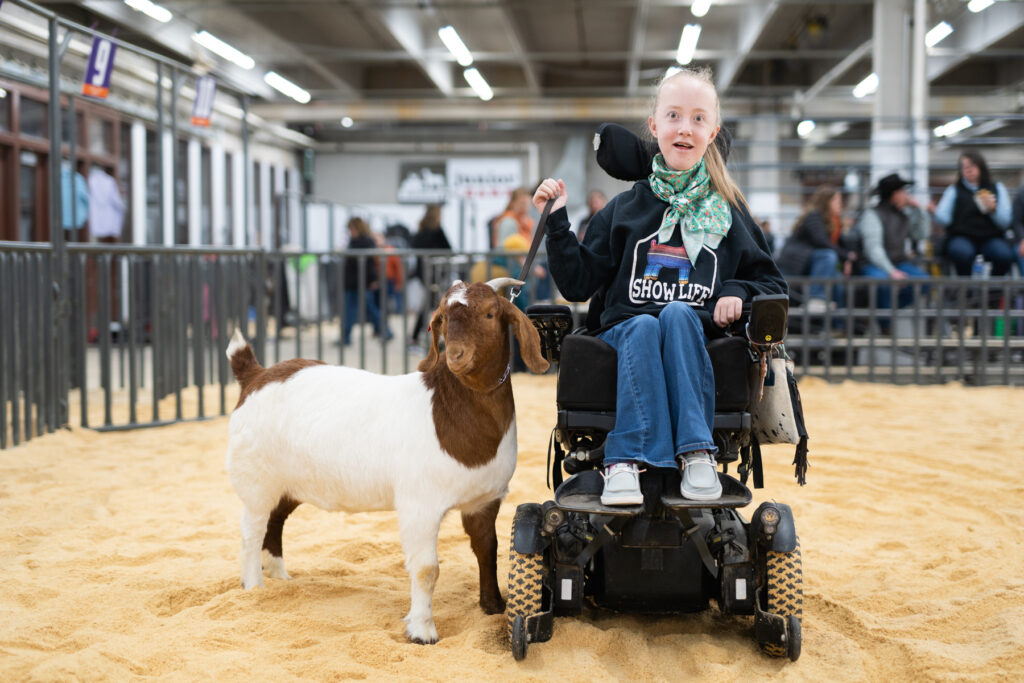
Lexi Bingham with her goat Paisley at the 2024 Western Stock Show in Denver.
In Collbran Colorado, most days will find teenager Lexi Bingham tending to her herd of goats, a passion she’s had from a young age.
“I have been in 4H for six years now, raising and showing Boer goats,” she said. “I went to my first ABGA (American Boer Goat Association) event when I was nine years old and fell in love with showing breeding stock.”
What sets Lexi apart from most goat breeders is the fact that she was born with muscular dystrophy.
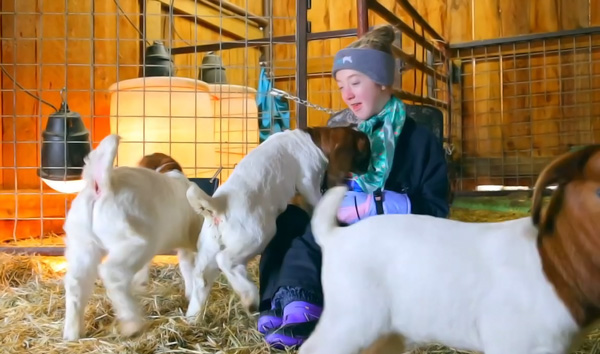
Lexi Bingham with her goats.
“She’s never been able to walk and never will,” her mother Mandy Bingham said. “And then last year she ended up having to have her entire spine fused because she was waiting on a new wheelchair and was just really having to lean and turn out of that chair. And because of that it caused her to have severe scoliosis, so much so that in the nine–hour surgery, she grew six inches.”
Although they had heard of AgrAbility in the past, it was a meeting with Leathers that helped the Binghams realize some of the ways the program could help their daughter achieve added independence.
“Candy definitely listened to everything we had to say as far as our concerns and what our situation was and devised a plan that was completely tailored to us and Lexi and our needs and not just something generalized,” Bingham said.
One of the most important changes was replacing Lexi’s traditional wheelchair with a track chair specially equipped for navigating muddy or icy pastures.
“Where previously with just her wheelchair, I was actually physically carrying Lexi out to the barn so she could still be with her animals,” Bingham said. “Really, she just wants to be a part of her herd management. So, the day-to-day care of her goats, she wants to be out feeding and watering and out when the babies are born.”
The track chair has also enabled Lexi to enjoy other outdoor activities, such as hunting, fishing and camping.
“I think it has been a blessing to our family as far as learning the resources that are out there for those with disabilities in agriculture,” Bingham said. “There are options available to those families to help either find resources or point in the right directions of people that can help you achieve those recommendations.”
Leathers stressed that AgrAbility support is available to any member of the agricultural community, not just owners or operators.
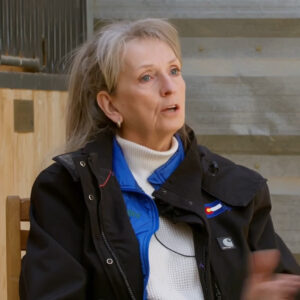
Candy Leathers, Colorado AgrAbility
“It can be a family member, it can be a child, it can be a parent, it can be a farm worker that might be on that farm or ranch,” she said. “We might work in a large dairy that may have had someone who got injured, and we were looking at how to modify their work so that they can continue to work. We may be on a farm or ranch to see one gentleman, and before we’re gone, we’ve met a dad and mom and maybe a grandson’s come in on a multi-generational farm. And we learned that there are other issues that may be happening there. So, it would be our objective to find out all their stories and see how we might help them navigate social service systems, programs that might be of help to them, and then look at the modifications and adaptations of assistive technology related to their disability.”
Leathers said examples of AgrAbility support can include addressing mobility problems, modifications to vehicles, computer technology to address vision loss, and a host of other resources. AgrAbility also can provide information on conferences, get-togethers and events with other farmers with disabilities.
“It doesn’t really matter what the disability situation is, we work with that farmer and rancher, what their priorities are to keep farming and ranching.”
“Don’t hesitate to reach out”
Leathers said AgrAbility gets most of its referrals from word of mouth, such as via a former client, family member or care provider.
“It’s hard to ask for help for this particular population,” she said. “It’s not an easy or natural thing for them. They’re wonderful about helping others, but they’re not very good at asking for help themselves. So, if they give us a call, we want to try to make that as easy as possible, as confidential as possible, and find out what really will work with them.”
For their part, Viswanathan and Bingham said they would encourage anyone facing disability related challenges in the agriculture community to contact AgrAbility.
“I would say don’t hesitate to reach out,” Viswanathan said. “The folks there are incredible, and they truly want to help. The resources are there, the information is there. You’re not the first person to go through something like this. You’re not the first person to try something like this. It’s been done before. So, I would definitely recommend using their resources to try and figure out what would work for you and help you achieve your goals.”
“I wish we would’ve done it a couple years earlier than we did,” Bingham added. “We kind of him-hawed around about it at first like, ‘No, we don’t really need it.’ And then as she got more and more involved into the agricultural setting, we decided that really was needed.”
For the Viswanathans, AgrAbility support has helped keep their dream of farming life alive and well.
“Once I realized that AgrAbility was a resource that could help us, and take that first step, we went for it,” he said. “Now we’ve got over a hundred chickens. We’ve got goats. We’ve got cows in conjunction with one of our neighbors on the property. So, we are definitely well on our way to achieving our goal.”
Learn more about the Colorado AgrAbility project at https://agrability.colostate.edu/

